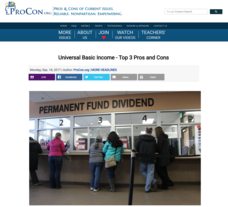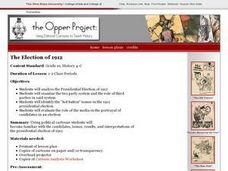iCivics
Limiting Government
While this instructional activity includes several nice worksheets to identify and discuss the various limits on government (i.e. a constitution, the rule of law, separation of powers, consent of the governed, etc.), its main value lies...
iCivics
Branches of Power
Learners take on the roles of the legislative, judicial, and executive branches of government in the United States and work to develop public policy issues and ideas into laws in this engaging and well-designed online interactive.
Humanities Texas
Primary Source Worksheet: Abraham Lincoln, Second Inaugural Address
Your young historians will be intrigued to read and analyze Abraham Lincoln's second inaugural address, which discusses the president's take on the causes of the Civil War and connections between the North and the South.
University of Florida
Understanding Car Crashes: It's Basic Physics!
Make an impact on young physicists with this fun collection of resources. After first watching a video and taking notes on the physics of car crashes, students go on to complete a series of activities that explore the concepts of energy,...
Humanities Texas
Primary Source Worksheet: Text of “Prouder, Stronger, Better"
Political ads as primary source documents? But of course. Viewers analyze the strategies involved in the Republican Party's 1984 advertisement in support of Ronald Reagan's reelection.
TCI
By George!
What better way to learn about George Washington and other United States presidents than with a fun board game? Learners review the accomplishments of Washington's administration through a collaborative board game, as well as draw...
School Improvement in Maryland
Evaluating Political Advertisements
How do interest groups try to influence elections? As part of their study of the election process, groups view 30-second advertisements produced by advocacy groups and use the provided worksheet to evaluate these ads. They then craft...
National Constitution Center
Thirteenth Amendment Poster
President Lincoln believed in the Thirteenth Amendment so strongly that he signed 14 copies of it, but died before he could see it passed on December 18, 1965. Explore the text that forever abolished slavery in America with a document...
DocsTeach
How Effective were the Efforts of the Freedmen’s Bureau?
Effective or ineffective? As part of a study of post Civil War America, young historians analyze a series of primary sources to evaluate the effectiveness of the Freedmen's Bureau in addressing the challenges faced by the slaves freed by...
Theodore Roosevelt Association
Defining America's Role in the World
As the first American president to win the Nobel Peace Prize, and only one of four presidents to do so in United States history, Theodore Roosevelt's foreign policy achievements and preservation of peace are often overshadowed by his...
Theodore Roosevelt Association
Interpreting the Past; Assessing Its Impact on the Present
Even though the presidency of Theodore Roosevelt ended over 100 years ago, we can still learn something from his stances and policies that is applicable today. Class members first look over a list of prevalent political issues from the...
Mr. Nussbaum
Thomas Jefferson Reading Comprehension
Discover a little bit about Thomas Jefferson in a brief reading passage. Learners then answer a set of multiple choice comprehension questions.
Albert Shanker Institute
Dream Under Development
As part of their study of the 1963 March on Washington, class members do a side-by-side comparison of the original text of Martin Luther King's "I Have a Dream Speech" with a transcript of the speech he delivered. The take away from the...
American Bar Association
What Is Separation of Powers?
Who has the power? Scholars investigate the creation of the three branches of government in the United States Constitution. They analyze just why the framers created the branches the way they did.
Constitutional Rights Foundation
The War of 1812: America’s First Declared War
Free Trade and Sailor's Rights! Pupils dive into America's first declared war, the War of 1812. They analyze the presidencies of Jefferson and Madison through diary entries and historical reasoning. To conclude the lesson, they use their...
State Bar of Texas
Marbury v. Madison
Who has the final say in matters dealing with the rules under the United States Constitution? The case Marbury v. Madison brings to light the issue of judicial review. Learners investigate the Supreme Court's opinion in the case with a...
Reading Through History
The Federalist Papers: Federalist Paper No. 51
How did Federalists feel about the federal government? Learners search for the answers in the Federalist Paper No. 51, which discusses the powers of the presidency. Then, they answer various questions to test for their comprehension of...
Newseum
Decoding an Editorial Cartoon
What advantages do political cartoons have over written editorials? Scholars discuss the topic by exploring editorial cartoons. Working in small groups, pupils analyze an Uncle Sam cartoon and complete a worksheet. As a fun extension,...
ProCon
Universal Basic Income
Should the United States adopt a universal basic income? After reading brief background information, scholars research the debate topic by reviewing the top three pros and cons. They also respond to a survey question and review other...
ProCon
President Ronald Reagan
At 69 years old, Ronald Reagan was the oldest man ever to be elected president in the United States. After reviewing a thorough history of Reagan's presidency, pupils read the main pro and con arguments to determine if he was a good...
ProCon
Voting Machines
Does technology always mean advancement? Scholars take a close look at the use of voting machines. Does using a machine make voting more effective? Readers consider the advantages and disadvantages of the current voting process. They...
Stanford University
Fort Sumter
The headlines screamed what everyone knew was coming: War! While Fort Sumter was considered the first battle of the Civil War, the engagement played differently in newspapers at the time. Using coverage from Northern and Southern...
Stanford University
Iraq Resolution
The 9/11 attacks propelled the United States into a period of low-grade war that has existed from that day all the way to current times. By looking at documents from the decision to send troops to Iraq in 2006, scholars connect the...
Curated OER
The Election of 1912
Tenth graders examine the Election of 1912. In groups, they identify the roles of the Democratic and Republican parties along with any third party mentioned. Using the internet, they describe the main issues of this election and discuss...
Other popular searches
- Presidential Inauguration
- Presidential Elections
- Presidential Protection
- Presidential Duties
- Presidential Cabinet
- 2000 Presidential Election
- 2008 Presidential Elections
- Presidential Election Voting
- Presidential Biographies
- Presidential Debate
- Presidential Powers
- Presidential Campaigns

























